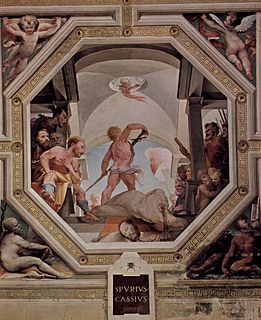Related Research Articles

Spurius Cassius Viscellinus or Vecellinus was one of the most distinguished men of the early Roman Republic. He was three times consul, and celebrated two triumphs. He was the first magister equitum, and the author of the first agrarian law. The year following his last consulship, he was accused of aiming at regal power, and was put to death by the patricians.
The lex Canuleia, or lex de conubio patrum et plebis, was a law of the Roman Republic, passed in the year 445 BC, restoring the right of conubium (marriage) between patricians and plebeians.
Agrarian laws were laws among the Romans regulating the division of the public lands, or ager publicus. In its broader definition, it can also refer to the agricultural laws relating to peasants and husbandmen, or to the general farming class of people of any society.
Lucius Minucius Esquilinus Augurinus was a Roman politician in the 5th century BC, consul in 458 BC, and decemvir from 450 to 449 BC.
Appius Claudius Crassus Sabinus Regillensis, usually referred to simply as Appius Claudius Crassus or Crassinus, was a Roman politician during the fifth century BC. He was consul in 451 BC, alongside Titus Genucius Augurinus, and the same year chosen one of the decemvirs, a committee of ten men chosen in the place of consuls to draw up the tables of Roman law beginning in 451. He was the only member of the college to serve a second term in 450, having appointed himself to the position, together with nine others whose opinions agreed with his or whom he was able to dominate. They continued in office the following year, without bothering to hold elections, but were overthrown in a popular revolt, and the consular government was restored.
Monte Sacro is a hill in Rome, Italy on the banks of the river Aniene, some kilometres to the north-east of the Campidoglio. It popularly derives its name from being the site of rituals by augurs or haruspices and gives its name to Rome's Monte Sacro quarter.
The gens Verginia or Virginia was a prominent family at Rome, which from an early period was divided into patrician and plebeian branches. The gens was of great antiquity, and frequently filled the highest honors of the state during the early years of the Republic. The first of the family who obtained the consulship was Opiter Verginius Tricostus in 502 BC, the seventh year of the Republic. The plebeian members of the family were also numbered amongst the early tribunes of the people.
Titus Cloelius Siculus was a Roman statesman of the early Republic, and one of the first consular tribunes in 444 BC. He was compelled to abdicate after a fault was found during his election. Two years later he was one of the founders of the colony of Ardea.
Servius Sulpicius Camerinus Cornutus was consul at Rome in the year 500 BC with Manius Tullius Longus. The short form of his name is Camerinus.
Titus Sicinius (Sabinus?) a.k.a. Titus Siccius was a Roman Republican politician, possibly of the Patrician branch of an otherwise Plebeian gens Sicinius, during the beginning of the 5th century BC. He served as Consul of Rome in 487 BC, serving together with Gaius Aquillius Tuscus.
Titus Menenius Lanatus was a Roman patrician of the fifth century BC. He was elected consul for the year 477. He unsuccessfully fought the Veiientes, and was later prosecuted by the tribunes of the plebs for his failure to prevent the disaster of the Cremera.
Appius Claudius Ap. f. M. n. Sabinus Regillensis, was a member of the great patrician house of the Claudii at Ancient Rome. He held the consulship in 471 BC.
Servius Sulpicius Camerinus Cornutus was a Roman politician in the 5th century BC, consul in 461 BC and decemvir in 451 BC.
Titus Romilius Rocus Vaticanus was a Roman politician in the 5th century BC, consul in 455 BC, and decemvir in 451 BC.
Titus Antonius Merenda was a Roman politician, and decemvir from 450-449 BC.
Spurius Oppius Cornicen was a Roman politician and member of the Second Decemvirate in 450 and 449 BC.
Quintus Poetelius Libo Visolus was a Roman politician, and member of the Second Decemvirate in 450 and 449 BC.
Kaeso Duillius Longus was a Roman politician, and member of the Second Decemvirate in 450 and 449 BC.
The gens Rabuleia was a minor plebeian family at ancient Rome. Members of this gens are first mentioned in the early decades of the Republic, and Manius Rabuleius was a member of the second decemvirate in 450 BC. However, the Rabuleii subsequently fell into obscurity, and only a few of this family are known from later inscriptions.
Quintus Antonius Merenda was a consular tribune of the Roman Republic in 422 BC.
References

| This ancient Roman biographical article is a stub. You can help Wikipedia by expanding it. |